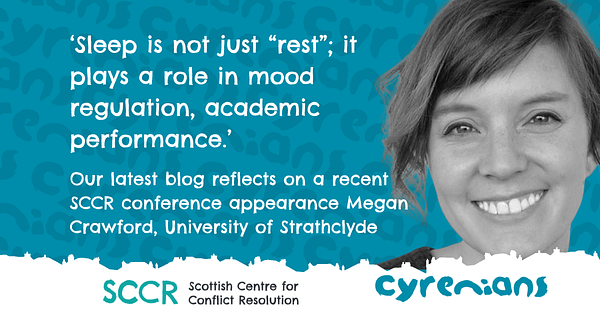Why Can’t My Child Wake Up and Get Ready for School on Time?
Is your young person having difficult waking up in the morning? Is it causing arguments? Wait - there may be a good reason they are sleeping in - and here's what it might be.

As part of SCCR's recent online conference, University of Strathclyde Reader in Psychology Megan Crawford tackled one of the most common and frustrating questions parents ask: Why is my teenager so tired, and why is it so hard to get them up in the morning? The answer, it turns out, lies not in laziness or attitude - but in biology, social pressures, and the modern sleep environment.
What Is Sleep and Why Does It Matter?
Sleep is a fundamental biological process shared across species, essential for regulating both the body and mind. Megan reminded us that sleep is not just “rest”; it plays a role in mood regulation, academic performance, brain development, immune function, and even facial appearance.
In adolescence, sleep is especially critical. It’s during these years that the brain is 'pruning' and strengthening connections. Yet, since 1991, the proportion of teenagers getting the recommended 8 to10 hours of sleep per night has significantly declined - part of what experts are calling a 'sleep deprivation pandemic'. In fact, only 5 or 6 out of every 10 teens across Europe are getting the sleep they need.
Why Teens Struggle with Sleep
Adolescents experience a natural shift in their circadian (which is defined as 'recurring naturally on a twenty-four-hour cycle') rhythms, meaning they feel sleepy later at night and want to sleep in later in the morning. Unfortunately, early school start times force them to wake up before they’re biologically ready, resulting in 'short sleep'.
Other contributors include:
- Academic pressures
- Increased autonomy over bedtime
- Social media and screen use
- Poor adult sleep role modelling
Megan pointed out that society still clings to outdated ideas like “you snooze, you lose,” despite evidence that long-term sleep deprivation is linked to serious health problems.
What Makes Up Good Sleep Health?
Sleep health isn’t just about how many hours we get. Megan outlined six key components:
- Regularity – going to bed and waking up at the same times daily
- Satisfaction/quality – feeling rested upon waking
- Duration – getting enough sleep to function well
- Timing – sleeping during the natural night-time window
- Efficiency – falling asleep quickly and staying asleep
- Alertness – staying awake and attentive during the day
Helping Young People Sleep Better
So, what can parents and carers do to support better sleep for teenagers?
1. Create a “Sleep Haven”
Megan recommended designing a bedroom environment solely for sleep:
- Keep it cool, dark, and quiet
- Remove pets and electronics
- Eliminate light sources, especially blue light from screens
- Reserve the bed only for sleeping
2. Establish a Wind-Down Routine
A good night’s sleep begins with a smooth transition. Encourage calming pre-bed activities such as:
- Journaling
- Reading
- Listening to quiet music
- Stretching or light yoga
Megan also introduced several relaxation techniques:
- Progressive muscle relaxation
- Diaphragmatic breathing
- Imagery training
- Autogenic training
These methods reduce arousal and make it easier to fall and stay asleep.
The Role of Substances and Diet
Megan cautioned against common habits that interfere with sleep:
- Nicotine and caffeine are both stimulants that disrupt the body’s natural rhythms.
- Alcohol, although it may induce drowsiness, leads to fragmented and low-quality sleep.
- Eating heavy meals before bed taxes the digestive system and prevents proper rest.
At the same time, hunger or dehydration can also delay sleep. The goal is to strike a healthy balance: light snacks and hydration a while before bed, but not too close to lights out.
Sleep Is Not a Luxury — It’s Essential
Finally, Megan stressed the need to treat sleep as a biological necessity, not an optional extra. By recognising the specific needs of adolescents and making practical changes to their environment and routines, parents and caregivers can support healthier, more consistent sleep habits.
If you'd like to watch the talk that Megan made as part of our online conference, you can, right below!





